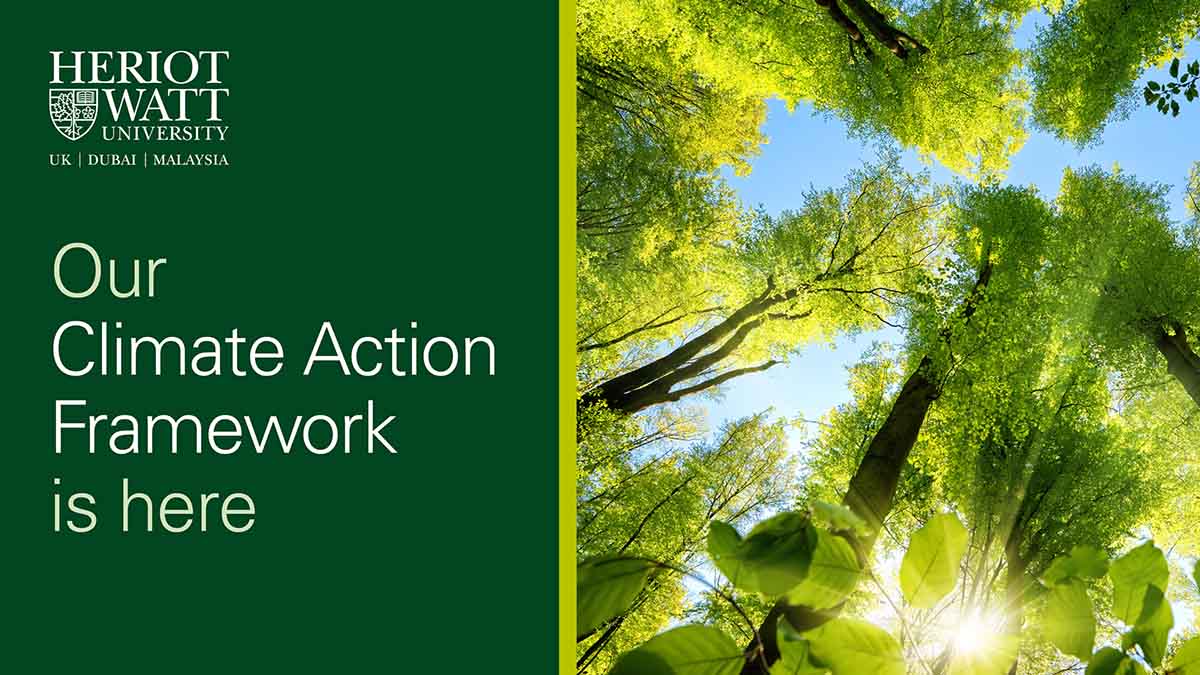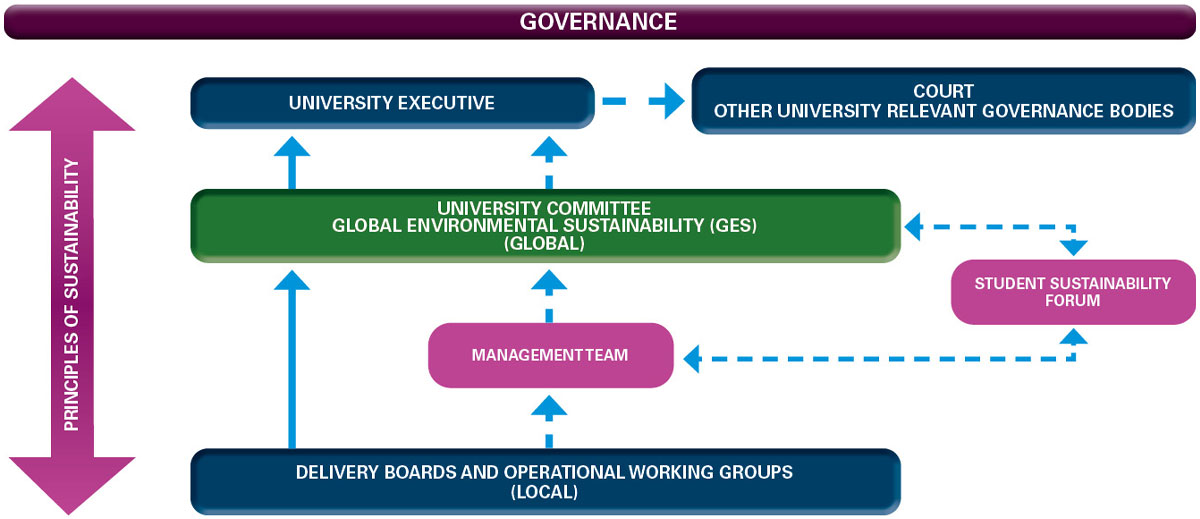Governance, Strategy and Policies
Our commitments and strategy
A strategic performance indicator of our Strategy 2025 is Environmental Sustainability, underpinning our global strategy and commitment to meeting the SDG goals, as outlined in our Ten Commitments to Sustainability.
Our approach to delivering on our institutional commitments and how we operationalise them have been published in our Climate Action Framework as well as our associated policies, underscoring our commitment to mobilising collective efforts towards a net-zero future and demonstrates our ongoing progress.
Climate Action Framework

Our ten institutional commitments are:
Leadership Through Action
Commitment 1 - Inform, empower, and support our global community in delivering the SDGs.
- We engage with our global staff, students, alumni and external communities in developing plans to advocate change.
- One of our key initiatives is the launch of our Climate Advocacy course.
Commitment 2 - Commit to achieving Net Zero by 2035.
- Our Climate Action Framework outlines the steps the university is implementing to meet this target.
- We have begun to decarbonise our campuses with no fossil fuel heating at the National Robotarium or GRID buildings, a continuous programme for Green Building Certification on our Malaysia Campus and the detailed modelling for future renewable generation projects.
- Heriot-Watt University Dubai was recently awarded a prestigious Gold certification from “My Green Lab” the first academic institution in the UAE to achieve this feat.
- In 2024 we achieved the Green Kitchen Standard for our Edinburgh Campus and piloted Klimato carbon labels to highlight food carbon footprint.
- We are signatories to The Global Climate Letter for Universities and Colleges, a partner to the Race to Zero by UNFCCC (United Nations Framework Convention on Climate Change).
Commitment 3 - Sign the Sustainable Development Goal Accord at an institutional level.
- We established the new University Committee for Global Environmental Sustainability, our global campus sustainability groups and the Student Sustainability Forums aid us in developing, updating and implementing our global policies and action plans.
Thought leadership and foresighting
Commitment 4 - Promote discussion and debate to encourage fresh thinking on how to achieve the SDGs.
- In 2022 The Hutton Series on Climate Changes brought together a diverse cross-section of speakers to identify ten key priorities, innovations & actions to mitigate the climate crisis. Hutton Series on Climate Change: Final Report | Panmure House
- Our Student Sustainability Forum initiative placed as a finalist by the 2024 Green Gown Awards in the "Student Engagement" category, recognising the work the University’s Global Environmental Sustainability team and the University’s Student Union officers have achieved with The Student Sustainability Forum.
Commitment 5 - Challenge ourselves, industry and national governments to achieve progress towards the SDGs.
- We recognise meeting the SDG’s can only be achieved through co-creating initiatives and developing partnerships. We introduced two new staff awards and sponsored the Heriot-Watt Student Union Volunteer Award for “Strive for Sustainability”. The Sustainability Champion Award joined the existing award categories within our Celebrating Our People Awards to commend outstanding efforts made by individuals or teams who champion a sustainable future. The Sustainable Futures Award, a new award category within the Principal’s Research Impact and Engagement Awards, recognises teams with outstanding achievement, innovation and creativity in finding research impact through the application of new technologies and approaches to sustainability challenges.
- In 2023 we participated in the Platinum Jubilee Report “Accelerating towards Net Zero”.
- We launched our sustainability engagement programme with staff and students participating in a Climate Hope panel and family day at the Edinburgh Science Festival.
Commitment 6 - Adopt a Strategic Environmental Assessment (SEA) process.
- We are developing a process to evaluate the environmental impacts of proposed policies, plans, and programs at a strategic level before they are implemented.
- This ensures environmental sustainability is considered in the early stages of planning, project and policy development, allowing for outcomes that balance sustainability with other objectives and the optimisation of environmental performance.
World-leading research, teaching and enterprise
Commitment 7 - Map and align our global presence in educational excellence and world-leading research with the UN SDGs.
- We focus our distinctive learning principles in the University’s Global Changemaker Curriculum Framework as a foundation for embedding learning for sustainable development across degree programmes.
- We support student internships in sustainability related to themes of the Climate Action Framework.
- We engage staff and student with sustainable development learning across the curriculum and co-curriculum, to evaluate disciplinary, cross-disciplinary, and global campus involvement.
Commitment 8 - Create a Global Research Institute in Net Zero aligned with an international Skills Academy for "green jobs"
- The University’s Global Innovation Challenge 2023 attracted 537 participants from four continents presenting wide-ranging solutions for sustainabilityGlobal Innovation Challenge 2023 attracted 537 participants from four continents presenting wide-ranging solutions for sustainability
- Our Centre for Doctoral Training in Industrial Decarbonisation (IDRIC), led by HWU, is upskilling postgraduate level students with industry.
Commitment 9 - Demonstrate and quantify the potential global impact of the radical innovations in research and policy.
- In Dubai, we're developing a digital twin of the campus and integrating energy use data for optimisation
Commitment 10 - Develop an enterprise accelerator programme to support start-up companies with radical approaches to carbon innovation.
- Our Global Research Institute (GRID) includes an Enterprise Hub to support business innovation, showcase emerging technology and inventions, and encourage staff and students to pursue the commercial potential of their creative ideas.
Governance in sustainability
Our Global Environmental Sustainability Strategy is community-based, data-led and influenced by science-based targets as we seek to reduce our environmental impact, enhance our climate mitigation and contribute to sector-wide efforts. We are proud to have contributed to a new tertiary education sector-led proposal on ‘Accelerating towards Net Zero', an ambitious roadmap for reducing CO2 emissions across the tertiary education sector. You can read can read or download the full report on this link at the Royal Anniversary Trust.
Specific actions arising from the commitments are the responsibility of Heriot-Watt University Executive and the governing body, The Court, working with the whole University community.
The strategy and policy documents below, and in development, detail the pathways to attaining these commitments:
- Global Environmental Sustainability Strategy
- Climate Action Framework
- Biodiversity Action Plan - our commitment to protecting and promoting biodiversity on our campuses,
- Strategic Travel Plan – Edinburgh Campus - our commitment to reducing the impact of travel associated with university operations on our largest campus
- Strategy 2025 - shaping tomorrow together
The University Committee for Global Environmental Sustainability (Chaired by the Deputy Principal for Global Sustainability) reports directly into the University Executive on delivery of the 10 commitments (above) and the sustainability objectives set across the whole University. Its purpose is to provide leadership and oversight of the delivery and further development of the University's Global Environmental Sustainability Strategy.
The membership includes:
- Deputy Principal (Global Sustainability), Chair
- Deputy Principal (Education and Student Life)
- Student Union President or Vice President (representing student voice on the Committee)
- Deputy Principal (Research and Impact)
- Chief Scientist
- Global Director of Information Services
- Global Director of Estates and Facilities
- Executive Dean
- Strategic Programme Lead, Global Sustainability
Read the Terms of Reference of the University Committee for Global Environmental Sustainability.

Our dedicated Sustainability management team are:
- Deputy Principal for Global Environmental Sustainability: Prof. Mercedes Maroto-Valer. (Read more about this strategically important role)
- Strategic Programme Lead for Global Environmental Sustainability: Dr Lindsay Wilson
- Environment and Energy Manager: Chris Larkins
- Sustainability Strategy Coordinator: Anna Clark
- Community Engagement Coordinator for Sustainability: Caitríona Buggle
- Net Zero Support Officer: Emily Stone
- Project Support Officer: Flora Reynolds
- Sustainability Communication Manager: Lynda-Marie Taurasi
We are also embedding governance responsibilities relating to sustainability within each of the Terms of Reference for the Court and relevant Court Committees. This includes:
- Court
- Audit and Risk Committee
- Donations and Investment Committee
- Finance Committee
- Global Student Life Committee
- Governance and Nominations Committee
- Infrastructure Committee
- Staff Committee
Find out more about the Sustainability Team
Contact: SustainableHWU@hw.ac.uk